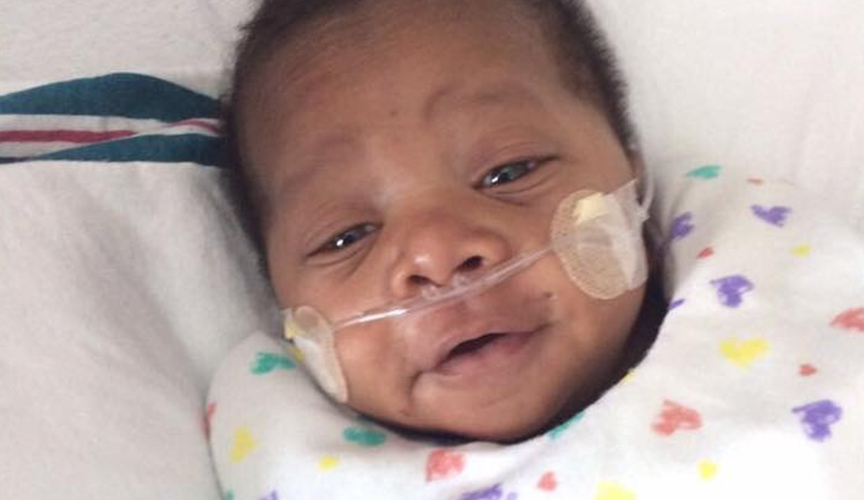Big Heart
When Katrina Dorse discovered she was pregnant, she was well on her way to building the career she had always wanted in Washington, DC.
“I’d planned and saved so that I could spend a few months at home in Memphis with the baby,” she said. Then, she planned to head back to DC, building a life – graduate school, a job – as a single mom.
That’s not how it worked out.
Within hours of Kellen’s birth on April 1, 2016, he was on his way to Le Bonheur Children’s Hospital, where doctors discovered at least seven different heart defects. He spent his first month in the Neonatal Intensive Care Unit (NICU).
“He was a full-term baby and looked normal,” she said. “No one mentioned surgery, and certainly the idea of a heart transplant never came up.”
Katrina learned to manage his medications and appointments as they headed home.
One day at Kellen’s cardiology appointment, the doctors told Katrina that his pulmonary valve stenosis had progressed. A cardiac catheterization was scheduled to repair the valve. It didn’t work, and Kellen didn’t recuperate well from the procedure. He was admitted to the Cardiovascular Intensive Care Unit (CVICU).
After weeks in the CVICU, Katrina knew the doctors and nurses well.
“When they wanted to do something with Kellen, they’d ask me first,” she said. “They made me feel valued, which helped me trust them more.”

The doctors, too, became trusted partners. Katrina asked Pediatric Cardiovascular Chief of Surgery Christopher Knott-Craig, MD, why Kellen wasn’t getting better.
“Nothing prepares you to hear that the only way your child is going to get better is if he gets a new heart,” she said.
Kellen became the first heart transplant candidate at Le Bonheur, since the program relaunched in 2016, after a hiatus.
“There wasn’t another family I could talk to. Kellen’s insurance denied coverage because he was the first. Le Bonheur took care of it all,” Katrina said.
In order for a hospital to receive payment from insurance, transplant centers must be certified by the Centers for Medicare and Medicaid Services (CMS). However, CMS only approves centers who demonstrate successful outcomes.
“If a hospital wants to start a transplant program, they have to do the first few with no payment. The hospital has to make the transplant investment on the front end and take the risk that it will be certified by CMS,” said Jane Hanafin, senior director of the Heart Institute. “Because of the support of our donors, we were able to be committed and purposeful in our pursuit of a program that will benefit children in heart failure.”
Kellen had three more surgeries in an attempt to get him ready for the transplant, but his condition kept deteriorating.
“The day of the first conversation about the transplant was the last time I saw him smile,” said his mom.
Kellen died Sept. 16, 2016, never having gotten a new heart. He was 5 months old.
“It was a rough journey,” said Katrina. “But we had incredible support from our church and our family. I would see so many families who didn’t have money for gas to get to the hospital, to eat in the cafeteria. There were babies who didn’t have a family member at the bedside because there were three other children and mom had to be at work.”
That’s how the Big Heart Fund was born.
It started out as a small drive for toys for the tiny patients and dinners for their families, in partnership with the Forrest Spence Fund. Soon, though, Katrina realized the need was bigger.
“Congenital heart disease affects one in 100 babies, more than childhood cancer,” she said. “In a room of 100 people, someone was a Kellen.”
The Big Heart Fund’s support has grown from Visa gift cards, gas money, toys and noise machines to drown out the beeping and distractions of the CVICU. Each transplant patient receives a personalized superhero cape – a nod to Kellen who received a similar cape from a nurse honoring his resilience. This spring, Katrina is launching the first parent support group to help these families navigate the unique journey. The first one meets on April 1, which would have been Kellen’s third birthday.
“Katrina is a very special person,” said Knott-Craig, who also serves as executive co-director of the Heart Institute. “She’s able to share with other parents that they are part of a caring team. She’s been there herself, and she can empathize with them.”
“She’s good at making complex ideas easier for parents to understand,” he added. “And not just for parents and families, but also nurses and physicians.”
Katrina’s efforts today are an outpouring of gratitude to the team at Le Bonheur who cared for Kellen.
“So much of what we do now was inspired by the wonderful staff at Le Bonheur. I love to share how that influence has carried me and many other families through so many hard times,” she said.
Kellen’s legacy continues to inspire Katrina – she is now a candidate for a master’s degree in social work at the University of Memphis and continues to build relationships on the cardiology floors at Le Bonheur.
“I always tell parents: You don’t know how strong you are. You can do this,” Katrina said.
Help us provide the best care for kids.
Le Bonheur Children's Hospital depends on the generosity of friends like you to help us serve 250,000 children each year, regardless of their family’s ability to pay. Every gift helps us improve the lives of children.
Donate Now







